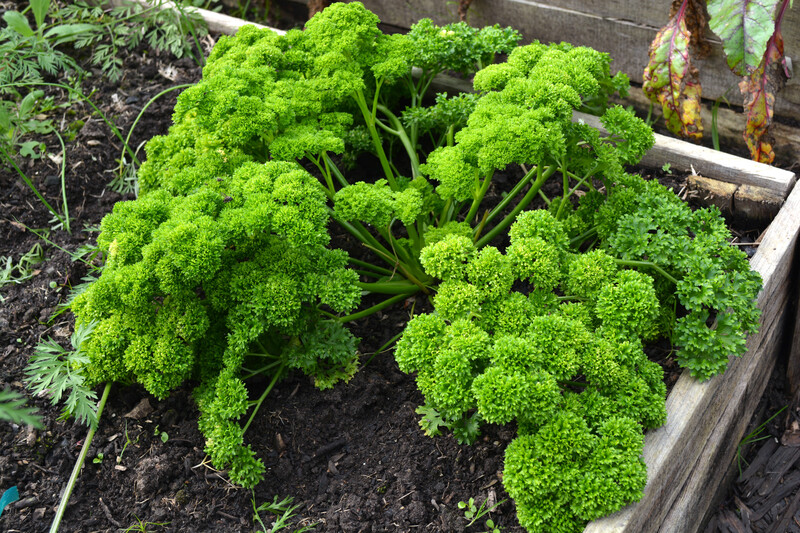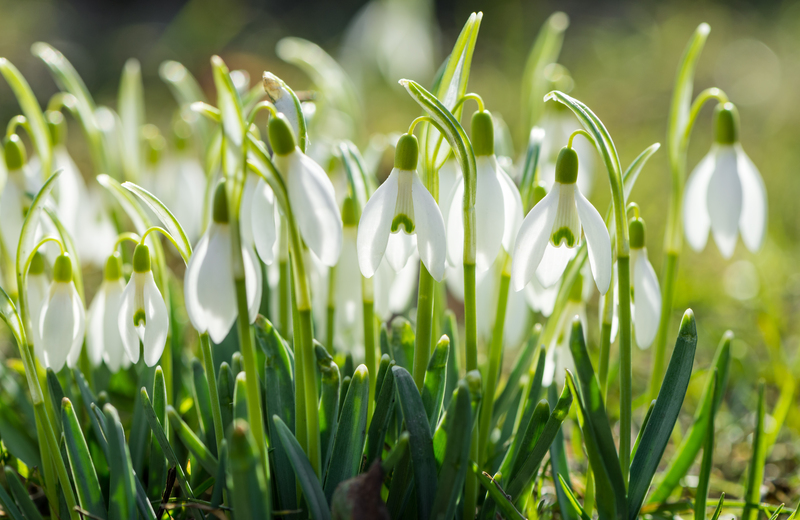Eco-Friendly Herb Gardening Strategies
Posted on 03/07/2025
Eco-Friendly Herb Gardening Strategies: Sustainable Approaches for Bountiful Herb Gardens
Eco-friendly herb gardening is more than a trend--it's a commitment to nurturing your plants while preserving our planet. By adopting earth-conscious techniques, you can grow fresh, fragrant herbs without relying on harmful chemicals or unsustainable practices. In this comprehensive guide, we'll dive deep into proven strategies, smart tips, and innovative methods to create a thriving herb garden that's truly green.
Why Choose Eco-Friendly Herbs Gardening?
Choosing environmentally friendly herb gardening methods brings a host of advantages for both you and the world around you, including:
- Healthier herbs without synthetic pesticides or fertilizers.
- Lower environmental impact due to reduced waste and chemical runoff.
- Support of local biodiversity by creating habitats for pollinators and beneficial insects.
- Cost savings from recycling, composting, and using natural resources efficiently.
- Personal satisfaction knowing you're gardening in harmony with nature.
Let's explore sustainable strategies for herb gardening that anyone can implement--whether you have a small balcony or an expansive backyard.

1. Start with Organic and Heirloom Seeds
The Benefits of Organic & Heirloom Seeds
- Free from chemical treatments and GMOs.
- Preserve genetic diversity and promote resilient plants.
- Often hardier and tastier compared to mass-market alternatives.
Seek out organic or heirloom herb varieties from reputable suppliers. Some popular eco-friendly options include:
- Genovese basil (for flavor-packed pestos)
- English thyme (for its hardiness and aroma)
- Thai basil (for spicy, fragrant leaves)
- French tarragon (ideal for gourmet dishes)
Supporting these seeds helps ensure long-term sustainability in home gardens and commercial agriculture alike.
2. Create Healthy Soil the Natural Way
Composting: The Foundation of Eco-Friendly Herb Gardening
- Start a home compost pile or bin using kitchen scraps, shredded leaves, and yard clippings.
- If space is limited, consider vermicomposting with worms or bokashi composters.
- Apply finished compost to garden beds and containers to boost soil nutrients.
Mulching for Moisture and Weed Control
- Use organic mulches--like straw, shredded bark, or leaf mold--around herb plants.
- Helps retain soil moisture, suppress weeds, and regulate temperature.
- Prevents soil erosion and gradually enriches earth as it decomposes.
Tip: Avoid colored or treated mulches, as these may contain chemicals that can harm herbs and soil life.
3. Practice Water-Wise Herb Gardening
Optimize Your Water Usage
Herbs like rosemary, sage, and lavender thrive in less water and well-drained soils. For eco-conscious herb gardening, try these approaches:
- Install a rainwater barrel to collect and reuse rainwater.
- Water deeply in the early morning rather than frequent light sprinklings.
- Group herbs by water needs to maximize efficiency.
- Use soaker hoses or drip irrigation systems to minimize evaporation.
Choose Drought-Tolerant Herbs
- Thyme
- Lavender
- Oregano
- Rosemary
These varieties require less irrigation, making your herb garden more sustainable while lowering your water bill!
4. Use Natural Fertilizers and Amendments
Skip the synthetic fertilizers and opt for eco-friendly soil amendments instead:
Best Natural Fertilizers for Herbs
- Compost tea - brew from home compost for a gentle, nutrient-rich liquid feed.
- Worm castings - boost beneficial microbes and minerals for root development.
- Fish emulsion - powerhouse for leafy growth, but use sparingly.
- Seaweed extract - supplies trace minerals and improves flavor.
- Bone meal - high in phosphorus, ideal for strong root systems.
Apply these amendments as needed to keep herbs happy and productive without environmental harm.
5. Embrace Eco-Friendly Pest and Disease Control
Integrated Pest Management (IPM) for Herbs
IPM focuses on natural, non-toxic methods for controlling pests and diseases while preserving beneficial insects and soil life.
- Attract beneficial insects (like ladybugs and lacewings) by planting nectar-rich flowers nearby.
- Encourage birds and frogs to visit your garden--these natural predators help keep pests under control.
- Handpick pests such as caterpillars and beetles when you spot them.
- Use mild homemade sprays such as diluted soap or neem oil only when necessary.
Disease Prevention Without Chemicals
- Space plants properly to allow airflow and prevent fungal diseases.
- Water at the base of plants to limit leaf wetness and reduce rot.
- Rotate crops if you grow annual herbs, to prevent soil-borne diseases building up.
Remember: Healthy, unstressed herbs are far less likely to be attacked by pests or diseases, so focus on prevention first!
6. Limit Plastic and Waste in Your Herb Garden
Eco-conscious gardeners strive to reduce, reuse, and recycle in every aspect of gardening. Here's how:
Choose Sustainable Containers and Tools
- Opt for biodegradable pots made from coconut coir, rice hulls, or compressed peat.
- Reuse yogurt containers, cans, or old mugs as quirky, zero-waste planters.
- Purchase stainless steel or wooden tools instead of plastic--these last longer and are easier to recycle.
Creative Garden Mulch and Accessories
- Repurpose cardboard boxes or newspapers as biodegradable weed barriers.
- Use natural garden labels like stones or wooden stakes instead of plastic tags.
Challenge yourself to eliminate single-use plastics wherever possible for a cleaner, greener gardening experience.
7. Grow Herbs with Pollinators in Mind
Pollinators like bees, butterflies, and hoverflies are vital for healthy ecosystems. Boost biodiversity and support these essential creatures:
- Allow some herbs--such as basil, cilantro, and dill--to flower. Their blooms feed and attract pollinators.
- Plant a pollinator-friendly border with native flowers near your herb garden.
- Avoid all chemical sprays, which harm or disorient beneficial insects.
- Provide a water source, such as a shallow dish filled with stones and water, for bees and butterflies.
Did you know? Some herbs, like borage, are legendary pollinator magnets and boost yields for nearby plants!
8. Practice Crop Rotation and Companion Planting
Eco-friendly herb gardening isn't limited to organic inputs--it's also about planning and plant relationships.
Crop Rotation in Herb Gardens
- Rotate locations of annual herbs each year to disrupt pest and disease cycles.
- Alternate plant families--mint and basil one year, parsley and cilantro the next.
Companion Planting for Herbs
- Pair basil with tomatoes to deter pests and boost flavor.
- Grow mint alongside cabbage, but keep it contained--it spreads fast.
- Dill attracts beneficial insects and improves growth for leafy greens.
- Separate aggressive herbs like oregano so they don't crowd out more delicate varieties.
The result is healthier plants, better yields, and natural pest balance without chemicals.
9. Consider Alternative Growing Spaces
Urban gardeners and small-space dwellers can still embrace sustainable herb gardening with creative solutions:
Vertical Gardens and Living Walls
- Install wall-mounted planters or recycled pocket systems to maximize vertical space.
- Choose compact herbs like chives, thyme, parsley, and mint for easy harvesting.
Herb Spirals: The Permaculture Approach
- Build a spiral-shaped bed using rocks and soil--this conserves space and creates microclimates.
- Plant drought-tolerant herbs at the top; moisture lovers like parsley and cilantro at the bottom.
Container Gardening
- Grow herbs in reusable pots on patios, windowsills, or balconies--just ensure good drainage and access to sunlight.
- Rotate containers during the season for optimal growth and protection from pests.
These methods make eco-friendly herb gardening accessible to all, regardless of land or location.

10. Harvesting and Preserving Herbs the Sustainable Way
Ethical Harvesting Tips
- Snip herbs in the morning, after dew has dried but before sun causes wilting.
- Never harvest more than one third of any plant at a time.
- Use sharp, clean scissors to ensure quick regrowth and reduce disease risk.
Sustainable Herb Preservation
- Air dry bundles of hardy herbs (like sage and thyme) in a shaded indoor area.
- Freeze chopped herbs in olive oil using ice cube trays for winter use.
- Store dried herbs in glass jars to avoid plastic waste.
These eco-friendly harvesting and storage solutions reduce waste and extend the enjoyment of your homegrown flavors year-round.
Conclusion: Start Your Eco-Friendly Herb Garden Today!
Eco-friendly herb gardening isn't just possible--it's rewarding, impactful, and accessible to everyone. By embracing sustainable herb gardening strategies such as organic growing, composting, water conservation, natural pest management, and biodiversity support, you can cultivate a thriving herbal oasis that nourishes both your kitchen and the planet.
- Start small, experiment, and celebrate your green achievements.
- Share extra herbs or seeds with your community to spread the environmental benefits.
- Continually learn about new eco-gardening methods and adapt your practices for greater positive impact.
With these eco-friendly strategies for herb gardening, you'll enjoy fresher, more flavorful harvests and contribute to a greener future--one fragrant sprig at a time.
Ready to grow your own sustainable herb garden? Grab your gloves, gather your seeds, and let these approaches inspire your next gardening adventure!
Latest Posts
Constructing a Delightful and Safe Garden for Young Adventurers
9 Proven Tips to Kickstart Your Gardening Experience
Transforming Your Garden with Clever Seating Area Ideas
Enrich Your Garden's Privacy with Speedy Growing Hedges
Evergreen Climbers for Shade: Turning Shadow into a Green Paradise

